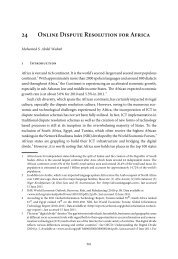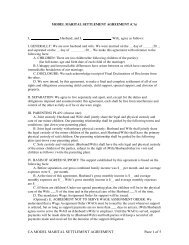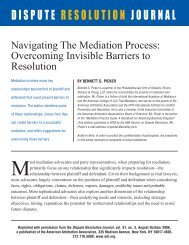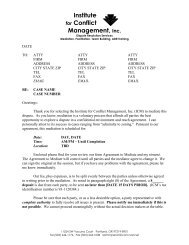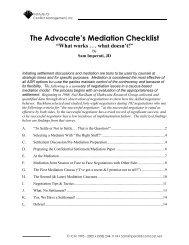17 e-Mediation - Mediate.com
17 e-Mediation - Mediate.com
17 e-Mediation - Mediate.com
Create successful ePaper yourself
Turn your PDF publications into a flip-book with our unique Google optimized e-Paper software.
<strong>17</strong> e-<strong>Mediation</strong><br />
as they begin their online work and find themselves missing these cues. Similarly, skills<br />
associated with designing a face-to-face setting for the meeting, choosing suitable seating<br />
arrangements, etc. are only very loosely <strong>com</strong>parable to web-platform design.<br />
Other skills will need to be “tweaked”: Mediators skills in process and time – management<br />
will need to take different time dynamics into account. Speed and pace have different<br />
effects online. 61 Mediators understanding of what happened “during sessions” as opposed<br />
to “in-between sessions” will need to shift to incorporate an ongoing, asynchronous process<br />
which is always, to some extent, “in-session”. They need to ac<strong>com</strong>modate familiar <strong>com</strong>munication<br />
skills such as active listening, reflecting and reframing, to the online environment. 62<br />
Still other skills are unique to the online setting: Mediators will not only require new<br />
skills with technology, they will need to be skillful at helping others find their way around<br />
technology, and at making them feel at ease with it.<br />
In a previous paper focusing on online negotiation, 63 four skill-sets required for text-based<br />
e-negotiators, dealing with writing ability, message management, relationship management<br />
and content management were highlighted. While too detailed to summarize in this section,<br />
I will note that e-mediators, themselves e-negotiators in addition to being charged with<br />
facilitating the parties negotiation, would do well to acquire those skills, and they should<br />
certainly form an important part of e-mediator training curriculum.<br />
Beyond skills required of e-negotiators, mediators need skills to serve them in process<br />
management and party management. Here are some examples:<br />
– Technological expertise: A mediator must be adept with the videoconferencing equipment<br />
she conducts her sessions through. If she relies on text <strong>com</strong>munication, typing<br />
skills, or adeptness with a talk-to-text conversion program are core capabilities.<br />
– Social norms: Online mediators must be able to practice “netiquette” and to understand<br />
and cope with the effects of its infractions.<br />
– Psychology of the medium: Mediators need to learn the psychological effects of <strong>com</strong>munication<br />
at a distance. 64<br />
– Trustbuilding: Mediators need to have a solid understanding of trust dynamics and of<br />
how interparty and mediator-party trust is affected and challenged by the online media.<br />
This ranges from how to build it to how to maintain it. The devil, it seems, is in the<br />
61 J.M. Brett et al., “Sticks and Stones: Language, Face, and Online Dispute Resolution”, Academy of Management<br />
Journal (2007) 50, 1.<br />
62 See Hammond (2003); Ebner (2007).<br />
63 Ebner (2009).<br />
64 See Jani & Getz (2010).<br />
389



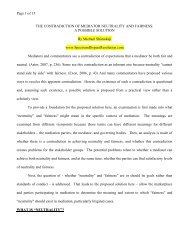

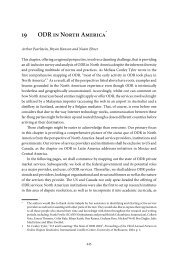
![Settlement Agreement Form [Agreement] - Mediate.com](https://img.yumpu.com/50682143/1/190x245/settlement-agreement-form-agreement-mediatecom.jpg?quality=85)

